
Les Moulins Mahjoub, nestled in the heart of Tunisia in the fertile Mejerda Valley, has garnered international acclaim for their high-quality food products and dedication to environmental stewardship. They have a deep commitment to organic farming practices and the preservation of the region’s culinary heritage. During our visits with them, we are continuously impressed with their extensive knowledge and reverence of their land and culture – and their desire to move agriculture forward within Tunisia and the broader world. Their farms are lush and thriving ecosystems, clearly born from intentionality – and they serve as a global example of sustainable agriculture and traditional craftsmanship. Eager to share what drives their actions, we sat down with them to discuss their agricultural philosophies.
Regenerative agriculture offers a holistic framework that focuses on restoring soil health, enhancing biodiversity, and promoting resilience and productivity within the farming ecosystems (which in turn creates foods of top quality). Les Moulins Mahjoub practices a whole systems approach with a closed loop. This means that they grow and process almost every one of their products from scratch – and that their inputs and outputs are part of the same system. Their water and compost are recycled to be used again, and the nutrients stay within the soil.
At the heart of their philosophy is their commitment to the health of the soil. During our two-hour interview with Abdelmajid “Majid” Mahjoub and his two nephews Badr and Ghazi, they repeatedly emphasized their belief that soil health is paramount to the success of their whole systems approach on their farms. They say the health of their farms, bodies, and the whole earth can be distilled into microscopic single-celled organisms that live in the soil and in turn, the plants they grow. Their big picture philosophy seemingly hinges on tiny microbes we can’t even see. They are a capstone feature in the whole loop and a microcosm of the larger ecosystem. Ghazi explains, “We went straight to the microorganisms because they are the final link in this chain.”

Majid begins to explain more. “I want to start with a very big idea, from which our vision comes at Les Moulins Mahjoub,” he says. “This is the idea that our bodies are managed by microbes.” The human body has more microbial cells in it than human cells. “We are bacterial creatures. From this point we start to think about all life: how is it organized? The whole earth is structured by bacteria. It’s in the soil, the vegetables, and we use it to ferment our products.” He began to demonstrate how all the treasured culinary items we enjoy – cheese, wine, olives, etc. – would not exist without rich bacteria and the lactic fermentation needed to create them. One gram of soil contains more than one billion microorganisms. “When you kill them, you stop the life. What gives us a tasty product is the work of these organisms in the good earth. It’s unbelievable,” explains Majid.
Majid speaks with a philosophical urgency, pressing us to examine the way we organize our lives. “We are only interested in the real life. Our interest was never for organic by itself, but as a way to preserve the real life, for the real happiness. It is in the protected earth.” He means that the method of organic farming is the result of their philosophy of fostering biodiversity and natural bacterial processes in the soil. It’s not just for a certificate. Badr adds, “We are driven by the earth and the soil, not the market.”
Majid goes on to lament the setbacks Tunisia faced when European agricultural chemical companies began selling and dumping their products onto Africa after a ban in the European Union. Most African countries have an agricultural foundation, and Tunisia has a rich history of farming organically. Majid brought this important issue to the Tunisian Department of Agriculture and they have since banned certain chemicals for use in Tunisia (a huge win for the country and their farms).
Desertification is a real threat to much of Africa – and Majid thinks this is being caused by two major “mistakes”: those toxic farming chemicals and pastoralism (the practice of animal grazing). Not a bad thing in and of itself, pastoralism is something Majid doesn’t find appropriate in a sunny, dry climate like Tunisia. The Berber people, native to Tunisia thousands of years ago before the Arab migration brought pastoralism, added nutrients to the soil by filling compost to holes they dug in between rocky hills. “We modify the Berber tradition because it’s well adapted here,” Majid says. This is why they prefer to focus on growing plants (not grazing animals).

He outlines a few “enemies” of soil health: sun, aridity, and barrenness. How do the Mahjoubs prevent these problems of desertification and erosion? They keep the soil nourished at all times. When left bare, the earth in a hot, sunny country like Tunisia is basically barren and dead. The Mahjoub fields are never left uncovered – they are always planted or being prepped for planting.
Ghazi says, “Crop rotation is the way of keeping the soil nourished. We give the soil rest by planting other plants that give back to the soil while keeping it covered. It rests with a cover that will not deplete it more. We plant beans and legumes that ‘fix’ nitrogen into the soil. These plants have little nodules or bulbs that concentrate nitrogen. We cut them at the correct moment to give back that nitrogen to the soil. This practice also captures humidity, one of the most important factors for life in the soil.”
Les Moulins Mahjoub also collects the cow manure in the region to compost and spread it on their fields as a nutritious amendment. “Cow manure is our gold,” Ghazi explains. They only use a few animals on the farms, but the ones they do use have a special purpose: gentile soil tilling. Their mule, named Samir, lightly tills with his hooves without compacting the soil. This gives the earth a “floaty, light texture that allows the plants to develop a grip for their roots. They absorb water and nutrients correctly when the soil is aerated,” explains Ghazi. “He’s a great guy.”

Hooves (as opposed to tractors) aerate the soil and give the microorganisms the oxygen they need. Worms, insects, and bacteria make little galleries in the soil and well-aerated topsoil allows them to perform their “jobs.” Ghazi says this allows nutrients to be delivered to the plants in a process called mineralization. “Microorganisms take any nutrients we put on the soil, and then transform and decompose it with enzymes to create clay. You can have all the organic matter in the world, but with no microorganisms, nutrients will not be available to the plant.”
Another thing a visitor would notice are all the trees they have planted on their farms. Majid explains they are often planting fig and mulberry trees to provide shade and humidity. “The microorganisms are not supported when the fields are bare and baking in the hot sun all year round.”
As we were speaking, we kept having the realization that truly every element on the Mahjoub farms is interconnected like a web or a giant puzzle. Every piece is integral to the success of the whole – and if one is removed, the system must shift. Ghazi says, “Every single creature has an important role for the one next to it, all the way down to the microorganisms.”
The Mahjoubs revere the creatures that visit their farms, like wild boars and foxes. They host bees on their farms for pollination; “Our bees are our babies, we rely on them for everything. They are the workers that do a lot of what we can’t. Bees are a bioindicator species.” Bees reflect how the farm is doing, like an alarm system. Ghazi also works intimately with birds and raptors; they have rehabilitated 80 birds so far, the only one in Tunisia to do so.

Their products are the beautiful expression of these tiny puzzle pieces that fit together in their system. For example, the figs and mulberries harvested from the trees that provide shade and humidity to the soil turn into decadent jams. All parts of the artichokes are harvested (as Majid says, “All artichoke products are medicine and rich in microbiota. The best source of fiber and good for our health”), but whatever else they cannot use, gets composted and added back to the fields.
The Les Moulins Mahjoub dedication to sustainability and health extends beyond the fields into the kitchen. They practice traditional sun drying for many of their products: tomatoes, peppers, couscous, figs, and many more. Not only is it more energy efficient with zero gas emissions, but this process also creates and concentrates taste. The flavors accumulate with time.
They also use very low pasteurization so that the heat does not kill the beneficial bacteria and nutrients in the product. The processing building uses an extensive filtration system so that they are not obliged to use strong chemicals and biocides to clean. This air flow acts as a mechanical barrier for all extra suspended air particles or pathogens. They want to ensure their workers are in a clean environment with no strong chemicals.
Les Moulins Mahjoub is using their whole systems approach as a pathway to ensure sustainable food production while mitigating the effects of climate change and chemical toxicity. All the water used in their processing plant is pumped back directly onto their farm. They are currently using drip irrigation on their plants as it is the least wasteful watering method as of now. Ghazi explains that in their arid environment, they have a continued need for high quality water, and more of it. They are investing in a desalination plant that would filter salts and other compounds out of their groundwater and aquifers. This would allow them to recycle water better, use less of it, and regulate the amount of salt based on the plants’ needs. They are excited to embark on this highly technical project, and we will certainly report back with the results.

“We are going for total autonomy and efficiency,” Majid says. His concern about the threat of climate change on food production is palpable. They are also geared up to start installing a photovoltaic energy system on their farms. The sun is plentiful, so they are “going big with solar,” Ghazi adds.
By nurturing the soil health with a holistic approach and using innovative technologies, their farms are leading the way to increased resilience in the face of environmental and climate challenges. Badr says, “We want our philosophy to be spread throughout our country and around the world. The U.S. has shared with us a lot of technology, but Tunisia can give back tasty products and high quality agriculture. We are an agricultural country. Tunisia must make this exchange. We want to be a leader.”
Ghazi adds to this: “A true dream for us would be to bring Tunisia to the highest level of agriculture. We know we can do it with the right people and mindset. We try to set that example. Majid does a lot of work on changing legislation. We keep innovating, investing, doing the core work so that we can inspire people. There’s so much to be done. We will keep leading the way through the microorganisms, the love for the soil, and the earth.”
There you have it!